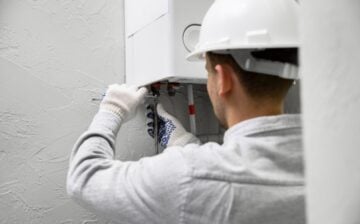
Homeowners typically function seamlessly for many years with a problem. The only thing to do is standard household upkeep and employ preventive maintenance by an expert service provider. The professionals will provide guidance on the tasks you should manage in between routine service calls.
As a homeowner, you can extend the lifespan of the hot water tank and how it performs throughout that cycle. With adequate care and upkeep, the conventional gas varieties can endure up to as long as ten years, while the tankless heaters can extend to nearly double that span.
You can make sure your water heater stands the test of time by following some tips and tricks for a tune-up by the experts. Let’s check these out.
Tips To Keep Your Water Heater Functioning for An Extended Life Cycle
The water heater is an essential system in the home, responsible for keeping the household in warm showers, helping to keep the house clean, especially the dishes, and so many other heated water purposes.
We can rely heavily on the unit but come to take it for granted over time, almost forgetting it’s there and neglecting its care. It’s vital to make sure the hot water tank receives adequate preventive maintenance from an expert service provider at least once each year so it can continue to operate at its peak for an extended life cycle.
You also need to seek the professional’s advice on routine household maintenance tasks to perform as the homeowner to encourage efficient functionality. Find details on replacing a water heater at https://www.familyhandyman.com/project/replacing-a-water-heater/. A few tips to help guide you through the care and upkeep in between the preventive tune-ups:
-
Where is the water heater
The water heater should be readily accessible for easy maintenance aside from your having explicit knowledge of where the unit is located within the household. The heater can often be found in an attic or basement.
It should be one of the first things you scope out when looking at a home for purchase and among the primary systems inspected when moving into a new home.
-
Allow plenty of room for the unit
The unit’s perimeter should consist of roughly 2 feet of clearance around the system because it requires “plenty of oxygen” for good operation.
If there is not an excellent oxygen supply, there will be a decrease in efficiency with the potential for damage to components within the heater, including the burner chamber.
The recommendation is to keep the system away from anything combustible since the unit is a heat source.
-
Educate on your specific model
You’ll want to educate yourself on the specifics of your model of water heater, including its type meaning “propane, natural gas, or electric,” or perhaps the unit is a “storage tank” or even a “tankless” system, and the functionality of your particular one.
You’ll need to know the age of your heater so you can gauge the life cycle and maintain the serial and model number and the gallon capacity. A service provider will likely ask for this information when taking care of the unit, especially if there is a warranty on the system.
-
Maintain control of the temperature
Many providers will set the temperature for the heater at roughly 120 degrees. Suppose you set the temperature at higher settings. In that case, the potential is likely for more extraordinary expenses with the utility cost and also for scalding when showering or using the water for other purposes like cleaning or drinking.
The suggestion is to follow the provider’s guidelines for optimum safety and energy efficiency.
-
Be mindful of the thermostat
The heat of the water is affected by the thermostat’s functionality, which is responsible for energy transmission to the heating element for hot water to be possible.
You will need to contact the service technician if you’re not getting hot water through the unit. The contractor will check the thermostat and either recalibrate the component or replace it.
-
Water heater draining
The tank can only provide fresh, clear, and clean water through the system if it’s washed out thoroughly. Doing so helps to eliminate the accumulation of sediment that settles on the tank’s floor.
This buildup has the potential to create significant issues, including blocking the pipes and disallowing proper function. Draining the tank and ridding the tank of the sediment allows greater efficiency and can possibly help keep the utility costs in check.
-
How do you shut it down
One vital step in educating on your water heater is understanding how to shut off the water and shut down the power supply before handling any sort of emergency.
There should be adequate labeling to help recognize the right power supply. When leakage occurs, you need to shut down immediately so you can contact the repair contractor to inspect and correct the defect right away.
-
Use insulation for the water tank
Check the water tank to see if the body feels warm to the touch. Warmth means there’s heating being lost from the tank.
The suggestion is to wrap the tank in insulation to hold the warmth in to ensure the water stays at temperature and increase the system’s efficiency. You’ll see results with energy costs by investing in a “jacket” for the unit.
Final Thought
Whether the system is in your basement, the attic, or if it’s hidden away behind a partition, find a way to ensure you don’t forget about its care and upkeep.
That could mean putting reminders on your mobile for the tasks that need to be handled or marking the date when you have a routine preventive maintenance tune-up.
This way, you’ll know when the next one is due the following year. It might be wise to go ahead and schedule that next appointment to avoid the potential for it slipping your mind.
We do tend to take our water heaters for granted, ultimately neglecting their care. These are among the most critical systems in the household. It’s crucial to take every measure to remember them.
We hope you found this blog post about Water Heater Installation Repair And Replacement Services, useful. Be sure to check out our post Try These Easy Hacks to Fix a Leaking Shower for more great tips!
Have Experience in the Moving Industry? Want an Additional Income Stream? Work With All Around Moving!
Adding a new revenue stream to your company can help you boost earnings. We’ll be there for you every step of the way. Partner with us and we’ll help you profit. Click here to learn more.






